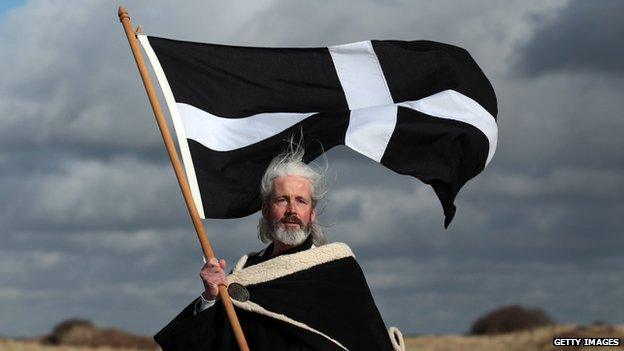On St Piran's Day, this is how Cornwall could govern itself
- Published

The people of Cornwall are celebrating St Piran's Day.
The English county has its own flag, language and its own special day but do people there want their own political powers?
Lib Dem leader and deputy PM Nick Clegg is in Cornwall outlining a new assembly promising more local control of areas like housing and education.
Cornish political party Mebyon Kernow says the idea is "ill considered" and "nonsense".
Some other critics see it as another layer of government taking responsibility away from the local council, which is the area's biggest employer.

Crimped Cornish pasties were made so miners and fishermen could eat them with dirty hands
All the main political parties are offering devolved powers hoping to win votes in Cornwall.
It is especially important for the Lib Dems because the area is seen by some as a stronghold for them.
But the Conservatives won three of the county's six parliamentary seats in the last election.
On St Piran's Day, Mr Clegg said that if the assembly was established Cornwall could choose to have different rules to the rest of England in areas including second home ownership, academy schools and bus services.

Lib Dem leader Nick Clegg is touring Cornwall he wants to create a Cornish Assembly
Northern Ireland and Wales have assemblies but the idea an English region could have their own is not new.
Back in 2004, a referendum on creating England's first regional assembly in the North East saw the idea rejected.
Twelve facts about Cornwall
The Cornish Flag, the Flag Of St Piran or St Piran's Banner (white cross on a black background) represents white tin flowing from the black rock, or good overcoming evil.
St Piran is one of three Patron Saints Of Cornwall. The other two are St Michael and St Petroc. Michael is associated with St Michael's Mount and St Petroc with Padstow.
Cornwall's St Michael has his own feast day celebrated on 8 May and St Petroc has 4 June.
It is the 12th biggest county in England.
Kernow is Cornwall in Cornish.
Cornwall has the longest coastline in Great Britain at 433 miles.
Truro is the only city in Cornwall.
Kernowek Standard is the official name for the Cornish language. It had died out in the 19th Century but is undergoing a revival.
Cornwall even has its own national anthem called Trelawney, which is based on The Song of the Western Men.
It is one of seven ancient Celtic nations along with Scotland, Ireland, Wales, Galicia, Brittany and the Isle of Man.
Author Daphne du Maurier set many of her novels in Cornwall.
The county is famous for its surfing but can also boast Cornish wrestling, its oldest sport.
BBC Radio Cornwall broadcasts a news bulletin in Cornish every Sunday night at 17:00 GMT.
Follow @BBCNewsbeat, external on Twitter and Radio1Newsbeat, external on YouTube